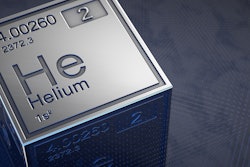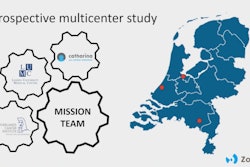The January 25 sale of the U.S. Federal Helium Reserve to a private company has raised concern that the deal could potentially impact domestic supply of the element used to cool MRI scanners.
As reported by NBC News, industrial gas supplier Messer was the high bidder for the Federal Helium Reserve, which is in Texas, Oklahoma, and Kansas and provides an estimated 15% to 30% of the U.S. helium supply. The privatization was mandated by the Helium Stewardship Act of 2013 but had been delayed several times.
Messer is very familiar with the Federal Helium Reserve, having run operations at the Crude Helium Enrichment Unit (CHEU) since April 2022 under a temporary agreement in partnership with the U.S. Department of Interior's Bureau of Land Management. The CHEU, which is owned by four companies including Messer, extracts and enriches helium for the reserve at the Cliffside Gas Plant in Amarillo, TX.
Supply interruptions?
Although trade organization Compressed Gas Association (CGA) declined to immediately comment on the news of the sale, it had recently raised concerns over its potential to interrupt helium supply for MRI scanners.
“From computer chips to medical imaging to the energy sector, helium is vital,” said CGA President and CEO Rich Gottwald in a statement. “This poorly structured and ill-timed sale would make life-saving MRI’s less accessible, the chips that connect everything from computers to cars to airplanes less available and would have an immediate impact on America’s national security. Any disruption in the supply chain would cause U.S. dependence on a country in the Mideast, a region in the midst of both war and attacks on shipping.”
Specifically, the CGA had highlighted the potential for significant operational challenges and nontransferability of the CHEU agreement. What’s more, it also pointed to issues with regulatory compliance with state-specific laws and regulations, as well as the possibility of operational delays and risks.
“Historical data from the [Bureau of Land Management’s] transfer of operation and maintenance in April 2022 indicates that transitioning to a private owner can result in months of delays caused by the need to identify and correct operational issues, put systems in place to comply with regulatory requirements and complete permits, impeding the facility’s ability to supply helium promptly,” the organization said in a statement.
If Messer completes the purchase expected, its status as current operator of the CHEU would seem to ameliorate some of those concerns. On January 22, Messer issued a statement noting that it had reached a milestone of delivering one billion standard cubic feet of helium from the CHEU. It also highlighted its 99% reliability record since taking over as CHEU’s operator.
“We are committed to sustaining the Federal Helium Reserve for the future to meet the helium needs of our customers and the many industries that depend on it,” said Chris Ebeling, Messer executive vice president of sales and marketing for North America, in the January 22 statement. “We understand the importance of helium in scientific, medical, and defense applications."
Supply chain problems
Medical technology trade association Advanced Medical Technology Association (AdvaMed) also declined to immediately comment on the announcement. But earlier in the week, it had also urged the White House to delay the sale and privatization of the Federal Helium Reserve until supply chain problems are mitigated.
“Only a few countries worldwide produce helium … [and] U.S. manufacturers tend to rely on the Federal Helium Reserve to meet the needs of the MRI machines installed throughout the country," President and CEO Scott Whitaker said in a statement. "There’s a real risk that these companies, and global companies that purchase our helium, will be forced to seek sources elsewhere. That’s particularly challenging, given the war with Ukraine and crisis in the Middle East, which has spilled over to the Red Sea, a major trade route.”
While acknowledging that vendors have been working in recent years to use less helium in new MRI scanners, AdvaMed noted that systems already in use are meant to last for years and aren’t easily replaced.
“AdvaMed urges the White House to delay the sale and privatization of the Federal Helium Reserve until outstanding issues identified by the Compressed Gas Association are resolved,” Scott Whitaker said. “Timely, critical patient care would suffer if helium supplies constricted further.”
If Messer completes the purchase expected, its status as current operator of the CHEU would seem to ameliorate some of those concerns. On January 22, Messer issued a statement noting that it had reached a milestone of delivering one billion standard cubic feet of helium from the CHEU. It also highlighted its 99% reliability record.
“We are committed to sustaining the Federal Helium Reserve for the future to meet the helium needs of our customers and the many industries that depend on it,” said Chris Ebeling, executive vice president of sales and marketing for North America in the January 22 statement. “We understand the importance of helium in scientific, medical and defense applications.”
Government comment
A U.S. Interior Department spokesperson told AuntMinnie.com that the U.S. is the world’s largest producer of helium and exports more helium than it uses.
“Over the past three years the U.S has depended on the federal helium reserve for less than 15% of the nation’s supply,” the spokesperson said. “Sale of the reserve to a private party, as Congressionally mandated by law, is not expected to meaningfully change the availability of helium.”




















